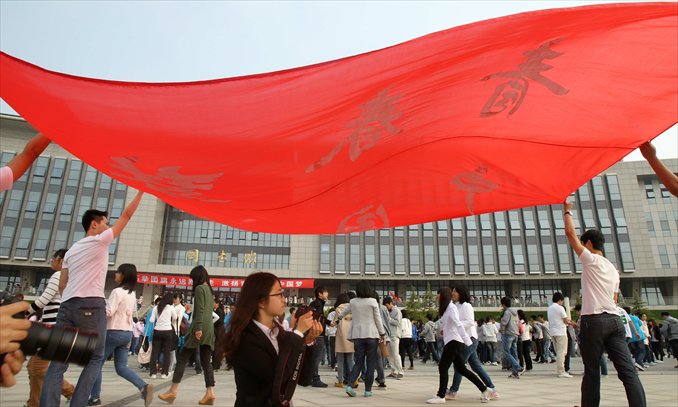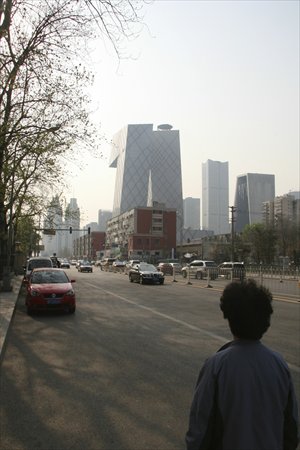Scholars strive to place individual pursuits in the national dream


The "Chinese dream" has without doubt become the buzzword of the year after President Xi Jinping took the top leadership position.
Xi defined the Chinese dream as achieving the "great renaissance of the nation," and vowed to realize it by the centennial anniversary of the country.
Everyone from scholars to workers is now talking about the Chinese dream. Grants are promptly offered for research projects related to the topic. Schools have started asking students to write poems, papers or launched other educational campaigns themed around the Chinese dream. In a recent speech on May 4, Xi urged the Communist Youth League to educate young people about the dream and use it to inspire a sense of responsibility.
But just what is in this dream?
Bridging the gap
At the closing ceremony of the National People's Congress in March, Xi explained the dream as achieving national prosperity, revitalizing the nation and bringing happiness to the people.
Despite all the country's recent achievements, individualism and materialism have taken the place of ideals among Chinese people, and there's also a disconnect between the growth of the country and the well-being of the common people, as reflected in the widening income gap, said Wu Bo, a researcher at the Academy of Marxism from the Chinese Academy of Social Sciences (CASS).
"It is against this backdrop that Xi raised the concept of the Chinese dream," said Wu, "in order to inspire people to have dreams, to look beyond material gains, and to unite people."
However, scholars have yet to figure out exactly what this concept entails. "The dream Xi proposed has three dimensions: the people, the country and the nation, and within each, there is still a lot of meaning to be interpreted," said Huang Ping, director of the Institute of American Studies at CASS.
Huang speaks about the dream in grand, vague terms, as do many scholars. He said that the Chinese dream should not be reduced to the trivialities of everyday life. "Ultimately, it's about what kind of a country and a people we want to become in the future, and where China stands in the world," he said.
"The dream is more abstract than goals; it is something that inspires, moves and unites people," he said.
Different interpretations of the dream determine the direction China will take, and at this time, not everyone agrees on this issue, said Wu.
Last year, Yu Jianrong, head of the Rural Development Institute of CASS, proposed a timetable for China's social and political development in the next decade. He advocated the protection of civil rights, social justice and fairness, freedom of speech, as well as judicial and political reform, with the ultimate goal of constitutional democracy. Yu said that this is his Chinese dream.
Many liberal scholars echoed Yu's vision and in the wake of Xi's remarks, have pushed for political reform.
Zhang Lifan, an outspoken historian, wrote on his Weibo that the newly-elected leaders have vowed to govern by the Constitution, strengthen the rule of law and rein in power. He urged the leaders to keep their promises.
But scholars like Wu argue strongly against these liberal opinions. "I think it's clear that we need to stick to socialism with Chinese characteristics, rather than western-style democracy," he said. Xi has, in his speeches, also emphasized this Chinese path.
Think tanks weigh in
Wu was one of a group of scholars at CASS who took part in a research project on the Chinese dream last year. The project concluded last October but the final paper was not published.
According to Phoenix Weekly, a magazine sponsored by the Hong Kong-based Phoenix TV, the project was assigned by Li Yuanchao, then head of the organization department of the CPC Central Committee. Li hoped that the concept of "the Chinese dream" could attract more overseas Chinese and students who study abroad to contribute to the development of the country.
Researchers from different disciplines debated the meaning of the dream, how it compares to the American dream, European dream and Japanese dream, and the path to achieving it.
In mid-April, two months after Hong Kong-based Phoenix Weekly published the story, the magazine issued an apology on its website, saying it had not run the story with the consent of the interviewees. The apology didn't allude to any factual errors.
Many scholars were reluctant to discuss the project but agreed to talk about the Chinese dream in general.
Academic discussions about the Chinese dream started even earlier.
"After three decades of reform and opening-up and the enormous progress we've made, it was time to dream," said Huang from CASS. He and his colleagues tried to explore the concept before the Beijing Olympics.
Wu Jianmin, former Chinese ambassador to France, initiated and hosted "The Chinese Dream and a Harmonious World" symposium for three years between 2006 and 2008 while serving as president of the Chinese Foreign Affairs University. A year before the first symposium, it was revealed that the slogan of the Beijing Olympics would be "One World, One Dream."
Wu said at the symposium that the Chinese dream is a shared one among 1.3 billion Chinese people of stability, prosperity, and is also shared by the rest of the world.
The Chinese dream has also been a topic of interest to foreign scholars who often take a different and more personal perspective than their Chinese counterparts.
Forbes columnist Helen H Wang, who was born in China and later became an American, published a book in 2010 called The Chinese Dream, which focuses on the rising middle class and their hopes and concerns.
More recently, Gerard Lemos, a former visiting professor at Chongqing Technology and Business University, published The End of the Chinese Dream last July. Lemos talked to people in Chongqing and wrote about their frustration, anger and fears. His book dwells more on the social problems in China and how they might hinder the country's pursuit of a prosperous and harmonious future.
Related articles:
Freedom vs harmony
The Chinese dream is often compared to the American dream, a phrase coined by writer and historian James Truslow Adams in his 1931 book The Epic of America. The dream that every American, regardless of their background, has the chance to pursue a better life and succeed through hard work, inspired people to pull the country out of the Great Depression and continue to prosper.
In the ensuing decades, this American dream was championed in political speeches, literature, and Hollywood movies, although there are fears that it's now losing its charm.
Freedom and individualism form the cornerstone of the American dream, and that is its main difference from the Chinese dream, said Huang.
The Chinese dream is born out of a different culture that views each individual in relation to other people and society, explained Huang. "Our culture values co-existence, harmony, the 'middle way,' while Western civilization is built on the laws of the jungle, competition and social Darwinism," he said.
The American dream emphasizes individual efforts and equal opportunity, but behind every success story, there are countless stories of failure, and not everyone has the same opportunity in reality, said Huang.
Wu, the Marxist scholar, also said that in socialist China the goal is not only to provide equal opportunity to individuals, but also to achieve shared prosperity. The purpose of a Chinese dream is not to replace the American dream or any other dream, but to add to the diversity of the world, said the scholars.
Balancing State and individual
Chinese people are taught from an early age that the interests of the collective trump those of the individual and that a person's fate is tied to the fate of the country. This line of thinking is also reflected in the expression of the Chinese dream.
"The American dream is the dream of the American people, and its foundation is the guarantee of individual rights, while the Chinese dream is the dream of the country," Yu wrote on his Weibo last December.
Xi said on various occasions that the Chinese dream is the dream of the country as well as of every Chinese. The Chinese people share the opportunity to have a wonderful life, to realize their dreams and to grow alongside the country, he said in March.
But after three decades of development, the dream of the individual is no longer fully aligned with the dream of the country, and it's precisely the relationship between the two that has not been well addressed, said Wu Bo from CASS.
In 2010, Zhou Tianyong, a professor at the Central Party School, published a book entitled The Chinese Dream and the Chinese Path. In the book, Zhou summarized the Chinese people's dreams in concrete terms, such as migration from rural to urban areas, housing and employment, social insurance, public services, and spiritual fulfillment.
"I felt that there's one important aspect missing from the whole talk of the Chinese dream, and that is the dream of every individual and every family," said Zhou.
Achieving this vision for the future requires a combination of the collective and individuals, said Zhou.
He said that Xi's remarks suggest that entrepreneurship and individual efforts are to be encouraged and valued, and the government is here to create the necessary environment for individual success.
But in today's society, young people don't necessarily believe in equal opportunities. Some believe that wealth, family background and connections are sometimes more important than talent, as corruption and nepotism are commonplace.
That's why reform is needed in areas such as education, social management, so as to address these problems, to restore social justice and fairness, and to encourage creativity and ingenuity, said Zhou.
Related articles: